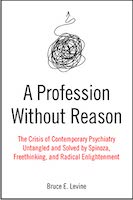
Many people are surprised to discover that electroconvulsive therapy, commonly called electroshock, is offered by UC Health in Cincinnati. The UC Health’s “Electroconvulsive Therapy” website claims, “Electroconvulsive therapy (ECT) is the gold standard for treatment of severe depression, and other psychiatric disorders,” and that “ECT is an extremely effective form of treatment.”
Patients deserve an informed choice of risks and benefits of any treatment, but unfortunately, the UC Health website fails to reference its claims.
For a scientist, to claim treatment effectiveness, randomized controlled trials are required. A controlled trial for ECT would mean that subjects and evaluators are blinded as to who is receiving the actual ECT and who is receiving a placebo, which would be a simulated sham ECT.
In actual ECT, patients receive electrical voltage when asleep with an anesthetic and a muscle relaxant; while in a sham ECT, patients would be put to sleep with an anesthetic and receive a muscle relaxant, but would not receive any electrical voltage. In a controlled trial, these two groups would be compared.
Have there been controlled trials on ECT? In a 2019 review of the research, “Electroconvulsive Therapy for Depression: A Review of the Quality of ECT versus Sham ECT Trials and Meta-Analyses,” published in the journal Ethical Human Psychology and Psychiatry, the reviewers lamented that there have been no controlled studies on ECT since 1985; and they assessed those studies done prior to 1985 to be of such poor quality that conclusions about effectiveness are not possible.
The reviewers concluded that given ECT’s adverse effect of memory loss, the “longstanding failure to determine whether or not ECT works means that its use should be immediately suspended until a series of well designed, randomized, placebo-controlled studies have investigated whether there really are any significant benefits against which the proven significant risks can be weighed.”
The UC Health website does acknowledge that “ECT may result in memory loss” but makes no mention of the study, “The Cognitive Effects of Electroconvulsive Therapy in Community Settings,” reported in the journal Neuropsychopharmacology in 2007. In this large-scale study on the cognitive effects of ECT − both immediate and six months later − the researchers found “adverse cognitive effects were detected 6 months following the acute treatment course.”
Such cognitive effects included pronounced slowing of reaction time and persistent retrograde amnesia, with such effects varying in severity depending on the ECT procedure and on patient variables (such as age).

Historically, with any treatment, there will always be positive testimonials. Scientists call these testimonials “anecdotal reports,” and these are not considered scientific evidence of effectiveness. While ECT advocates routinely offer positive celebrity testimonials, such as from Kitty Dukakis and Carrie Fisher, they ignore negative celebrity experiences.
When Ernest Hemingway was given ECT, he became even more depressed and complained: “What is the sense of ruining my head and erasing my memory, which is my capital, and putting me out of business?” In 1961, after a second series of ECT, Hemingway died by suicide.
Lou Reed, most famous for his song “Walk on the Wild Side,” wrote an angry song about his ECT called “Kill Your Sons.” In 1959, he was administered 24 ECT treatments, and his sister Merrill Reed Weiner recalls, “I watched my brother as my parents assisted him coming back into our home afterwards, unable to walk, stupor-like. It damaged his short-term memory horribly and throughout his life he struggled with memory retention, probably directly as a result of those treatments.”
ECT advocates are quick to point out that modern administration of ECT differs from what Hemingway and Reed received, however, memory loss remains an adverse effect of ECT.
In 2010, Naomi Judd did receive the modern administration of 24 ECT sessions, and she recalled in her 2016 autobiography, “About a month after the ECT treatments ended, I could tell that I was slowly falling back into thoughts of suicide.” She died by suicide in 2022.
Finally, the UC Health website claims: “One survey found that following ECT, most patients reported it was no worse than going to the dentist and many even found ECT less stressful.” I’m sure Cincinnati dentists would like to have the opportunity to assess the scientific validity of that survey, but UC Health offers no reference for it.




